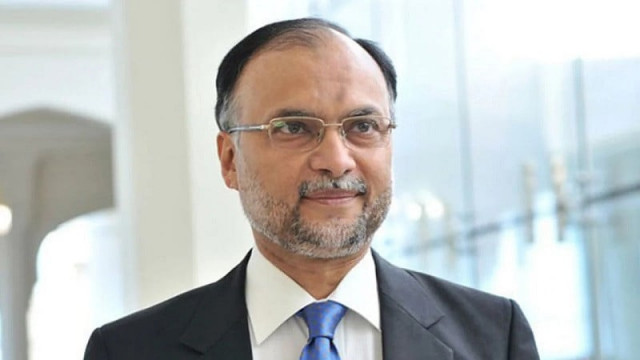Islamabad:
Planning Minister Ahsan Iqbal has proposed to urgently review the National Finance Commission Award and proposed freezing of the population number for 241.5 million and including indicators such as water and climate ulcer for money distribution among federal units.
Iqbal made the recommendations to Prime Minister Shehbaz Sharif and urged him to review the 15-year-old award that has survived his five-year constitutional life and requires a revision to ease “acute stress” of the federal government. The president of Pakistan expands the award each year due to a disagreement between the provinces and the center about the new formula.
The recommendation has been made at a time when the 10th National Finance Commission expired on July 21 and the Ministry of Finance, which is the Secretariat of the Commission, is in the process of forming a new commission.
Sindh has preserved Asad Sayeed and Khyber-Pakhtunkhwa may again be represented by Musharraf Rasool Cyan in the 11th Commission. Nasir Khosa may represent Punjab as his technical member, but there is no official notification yet to be issued after approval by the President of Pakistan. Balochistan has nominated Mr. Farman.
The Minister of Planning and Development has proposed new multi-criteria for distributing resources by focusing on development-oriented formula instead of demographically dominated award.
The Minister has proposed the Prime Minister that the population numbers should be frozen by the latest census (241.5 million) and its weight must be reduced from the current level to promote population stabilization.
82% of the NFC is distributed on the basis of the population among the provinces, which is an incentive to control the population and exaggerate the number.
Pakistan’s annual population growth is 2.6%, which is near the annual economic growth rate and is very unsustainable. The current horizontal distribution is heavily weighted (82%) against the population.
While the population is a significant indicator, this creates adverse incentives against population control and punish provinces with better demographic leadership, Iqbal said.
The Planning Minister has also recommended including provincial revenue benefits as a new criterion for distributing resources. He has written that there is a need to reward provinces with higher tax-to-BNP conditions and stronger digital tax infrastructure.
Provinces do not have incentives to expand their narrow tax base and rely strongly on their shares under NFC.
The Minister has also proposed to include environmental resistance as a new criterion by adding indicators such as forest coverage, climate adaptation investments and replanting efforts.
According to another important recommendation, human developmental results should be linked to the transfer of resources, and the province should prioritize education, health and gender equality.
The constitution requires that all five governments unanimously agree on the new formula, and although a government disagrees, no change can be made.
The Minister also recommended to include water vulnerability as another new criterion and proposed the allocation of funds to provinces investing in sustainable water infrastructure and management.
The minister has emphasized national unity and inclusion as benchmark for the distribution of money between the center and the provinces. The center gets only 42.5% share and is also responsible for expenses for Azad Jammu & Kashmir, Gilgit Baltistan and ICT from the divisible pool to ensure full participation in national development for their citizens.
The minister said that over RS150 billion is used annually by the federal government on development and recurring obligations in AJK, Gilgit-Baltistan and merged districts and Islamabad capital everything from the federal share, while these regions have the right to have their own share in the divisible pool as other provinces.
The federal government also funds Benazir Income Support Program (Bisp) to the tune of RS716 billion, despite the fact that social protection is a rejected provincial topic after 18.
Iqbal said there was a need to immediately initiate the process of a new National Finance Commission (NFC) award, which adds, it is both a constitutional obligation and a fiscal necessity.
Iqbal said that the 7th NFC price has now been in effect for almost 15 years – far beyond its intended duration and benefits regarding in the wake of new realities.
He said the federal government was facing tax pressure due to deviations in the current NFC price. A fresh NFC prize is therefore imperative to ensure that fiscal federalism remains dynamic, just and responsive to Pakistan’s evolving development landscape while protecting provinces rights, he added.
Due to limited fiscal space and higher expenses for debt service, the federal government is not left with enough fiscal space for development expenses. The Minister said the public sector development program (PSDP) is shrunken alarming – from 2.6% of GDP in 2018 to only 0.8% by 2025.
This regression not only represents a restriction on national development, but a systemic distortion of constitutional tax responsibilities with federal topics that are being underfunded, he added.
He also emphasized to encourage tax liability and generation of own revenue at provincial level and more importantly operationalization of provincial Finance Commissions (PFCs)
The constitutional promise of equity cannot be realized without intra-province distribution of resources. Provincial Finance Commissions (PFCS), which was imagined to decentralize resources within provinces, remain largely sleeping or non-transparent in their function, he added.
The new NFC price should make PFCS ‘operationalization mandatory as part of the NFC framework, the planning minister recommended.
Without adequate federal fiscal space, the implementation of flagship national programs – including special economic zones (SEZs), Digital Pakistan, National Grid, Dams, Human Resource Development and Multi Model Connectivity Infrastructure – compromised, the minister.



